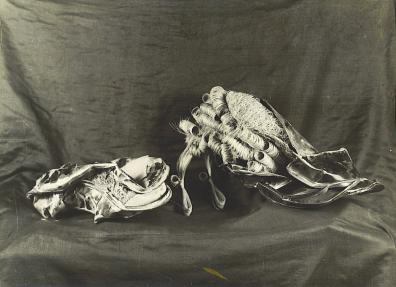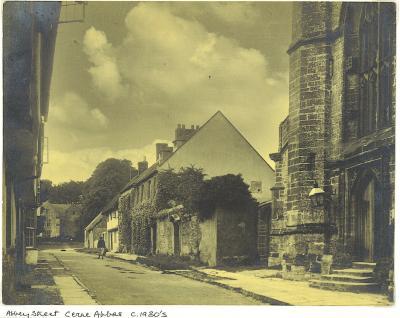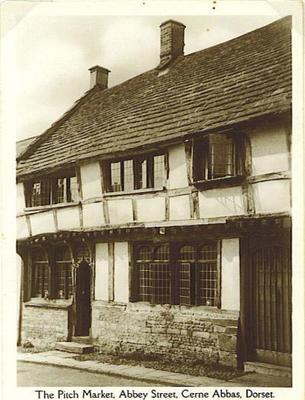CERNE ABBAS 1940-1945. (1)
A newspaper cutting, probably from The Times, slipped inside the pages of my "Baby Book", records that:
I was born in Harrogate because my mother's parents were living there at the time and the Blitz was causing havoc in London. My father's Chambers were at 5 Crown Office Row, which had probably been damaged when a bomb had fallen on Crown Office Row on 25th September 1940. Another bomb fell on the day of my birth, putting Chambers out of action completely, and his barrister's wig, still in its metal box but squashed flat, was rescued from the ruins: when the box was prised open, the wig sprang back into its original shape. A press photograph, taken before and after the box's opening, survives. Crown Office Row was entirely demolished and rebuilt in the 1950's.

However I was not to remain in Harrogate for long. On December 7th 1940, I travelled with my parents, by taxi, from there to the Pitchmarket Cerne Abbas, a journey of three hundred miles. They were to be ready to depart by 6 o'clock on the Saturday morning as there was to be no overnight stop. They took a cooked chicken with them and arranged for vegetables to be delivered on their arrival. They stopped for lunch at the Randolph Hotel in Oxford, where my parents took it in turns to go in for lunch, the other remaining with me in the taxi.
My mother had found living with her parents and her sister very trying. She wrote to my father:

Before the War, my parents rented the Pitchmarket as a weekend/holiday home, but shortly after the outbreak of hostilities in 1939, at my father's insistence and my mother's fury, they vacated their flat in Hampstead and moved to Cerne. My father moved into digs at 4 Rosslyn Hill, at the lower end of Hampstead High Street during the week, coming down to the Pitchmarket for weekends and the legal vacations.
Left on her own, unused to life in a small village, with only Tom, her cat, for company when she longed to be back in London with my father doing her "bit" towards the War effort, my mother felt miserable and abandoned. Her first week there in 1939, she wrote to her friend Vi Actland:
My father had applied for membership of the Army Officers' Emergency Reserve in April 1938 and had been accepted in September of that year. However a medical examination in January 1940 had resulted in him being passed only Grade 111 due to his defective eyesight, and this precluded him from membership of the A.O.E.R. Worse was to follow. A further medical examination took place in August that year when he was again passed as Grade 111 and declared unfit to become an officer. It was proposed that he should become a Private in the Pay Corps, with no prospect of promotion.
Apart from anything else, this would have been a financial disaster. As a highly successful barrister in a specialist practice, his income was around £1,500 a year, and a Private's pay would have been a pittance in comparison, not sufficient to pay his commitment of £6.10.0. in rent alone on the Hampstead flat, the lease of which he was unable to get rid of until February 1942. Then there was the Pitchmarket rent, a wife, and soon to be child, to support.
But more worryingly, not only for him but also for the other members of his Chambers, also serving in the Armed Forces, there was the future of the Practice at stake. He was by then the only one left to carry on, apart from the Head of Chambers, Mr Montgomery, who was past the call-up age. Had he gone, Chambers would have had to close, their goodwill, which had taken years to build up, would have vanished and they would have had to start again with nothing at the end of the War.
After much correspondence, his appeal against call-up seems to have been successful, and in October 1941 he enrolled in the Civil Defence for "prevention of fire" duties, which he continued to carry out throughout the Blitz.

We had arrived in Cerne after the long taxi ride from Harrogate on December 7th 1940. On December 19th I was baptised at St Mary's Church by the vicar, John Ray. My godmothers were Elizabeth Lillian Bower and my aunt, Florence May Whittaker. My godfather, Brian Hamilton Bird, was a close friend of my parents from the Oxford days whom we always called "Birdie". After the ceremony, a party was held across the road at The Old House, which at that time was a guest house.
<< Previous post · Next post >>
"On 17th October 1940, at the Imperial Nursing Home, Harrogate, to Bessie and George Drewry Squibb of Cerne Abbas, Dorset and 8 East Heath Road, Hampstead NW3, a daughter."The book records that I was born at midnight and the doctors in attendance were "Currie and Warham" and the nurse "A.G.U. Crosthwaith". It had been a long and difficult birth - labour had lasted sixty hours. This was against all expectations, but my mother was thirty four, and the stress of wartime life may have been a contributing factor. I was a big baby too, weighing 8lbs at birth, having "rosy cheeks, thick brown hair and very dark blue eyes and quite a temper".
I was born in Harrogate because my mother's parents were living there at the time and the Blitz was causing havoc in London. My father's Chambers were at 5 Crown Office Row, which had probably been damaged when a bomb had fallen on Crown Office Row on 25th September 1940. Another bomb fell on the day of my birth, putting Chambers out of action completely, and his barrister's wig, still in its metal box but squashed flat, was rescued from the ruins: when the box was prised open, the wig sprang back into its original shape. A press photograph, taken before and after the box's opening, survives. Crown Office Row was entirely demolished and rebuilt in the 1950's.

However I was not to remain in Harrogate for long. On December 7th 1940, I travelled with my parents, by taxi, from there to the Pitchmarket Cerne Abbas, a journey of three hundred miles. They were to be ready to depart by 6 o'clock on the Saturday morning as there was to be no overnight stop. They took a cooked chicken with them and arranged for vegetables to be delivered on their arrival. They stopped for lunch at the Randolph Hotel in Oxford, where my parents took it in turns to go in for lunch, the other remaining with me in the taxi.
My mother had found living with her parents and her sister very trying. She wrote to my father:
"Quite definitely another week is not to be considered chez mon pere. I feel no less ill and have collywobbles."I did not sleep much between 2 and 4am, which she thought might be "sympathetic nerves". She goes on to write:
"Dr C's (Currie's) letter is reassuring. I'm treated now as a neurotic, and one not responsible for herself!"

Before the War, my parents rented the Pitchmarket as a weekend/holiday home, but shortly after the outbreak of hostilities in 1939, at my father's insistence and my mother's fury, they vacated their flat in Hampstead and moved to Cerne. My father moved into digs at 4 Rosslyn Hill, at the lower end of Hampstead High Street during the week, coming down to the Pitchmarket for weekends and the legal vacations.
Left on her own, unused to life in a small village, with only Tom, her cat, for company when she longed to be back in London with my father doing her "bit" towards the War effort, my mother felt miserable and abandoned. Her first week there in 1939, she wrote to her friend Vi Actland:
"Do write and tell me all the happenings. When I think of the little uniform, tin hat, and all the FUN, I feel utterly frustrated. You are having a full and glorious new life. I am in a little backwater, tied up by a rope like a boat, by a careful and terribly clever husband. God bless him anyway in London, and God keep him and you and all I love."Her letters to my father, written then and through 1940, however, are always loving and resolutely cheerful. She describes Tom's devotion to her, her new maid, the fourteen year old Pam, and someone called "Mickey", who seems to have helped her keep house for some time. In one letter, not long after leaving East Heath Road, Hampstead, she is concerned that my father, still living in the empty flat, might be sleeping in a damp bed.
My father had applied for membership of the Army Officers' Emergency Reserve in April 1938 and had been accepted in September of that year. However a medical examination in January 1940 had resulted in him being passed only Grade 111 due to his defective eyesight, and this precluded him from membership of the A.O.E.R. Worse was to follow. A further medical examination took place in August that year when he was again passed as Grade 111 and declared unfit to become an officer. It was proposed that he should become a Private in the Pay Corps, with no prospect of promotion.
Apart from anything else, this would have been a financial disaster. As a highly successful barrister in a specialist practice, his income was around £1,500 a year, and a Private's pay would have been a pittance in comparison, not sufficient to pay his commitment of £6.10.0. in rent alone on the Hampstead flat, the lease of which he was unable to get rid of until February 1942. Then there was the Pitchmarket rent, a wife, and soon to be child, to support.
But more worryingly, not only for him but also for the other members of his Chambers, also serving in the Armed Forces, there was the future of the Practice at stake. He was by then the only one left to carry on, apart from the Head of Chambers, Mr Montgomery, who was past the call-up age. Had he gone, Chambers would have had to close, their goodwill, which had taken years to build up, would have vanished and they would have had to start again with nothing at the end of the War.
After much correspondence, his appeal against call-up seems to have been successful, and in October 1941 he enrolled in the Civil Defence for "prevention of fire" duties, which he continued to carry out throughout the Blitz.

We had arrived in Cerne after the long taxi ride from Harrogate on December 7th 1940. On December 19th I was baptised at St Mary's Church by the vicar, John Ray. My godmothers were Elizabeth Lillian Bower and my aunt, Florence May Whittaker. My godfather, Brian Hamilton Bird, was a close friend of my parents from the Oxford days whom we always called "Birdie". After the ceremony, a party was held across the road at The Old House, which at that time was a guest house.
<< Previous post · Next post >>


0 Comments:
Post a Comment
<< Home